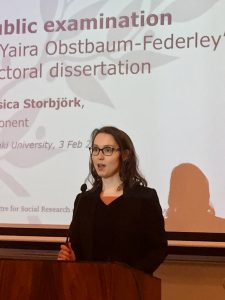
Two weeks have passed since CEACG researcher Yaira Obstbaum-Federley defended her dissertation. We interviewed her to see how she reflects on the work and the defence in the back mirror.
What do you argue?
–The prison has taken on a larger role in handling harm from substance abuse between the years 1985 and 2006. The numbers of persons with substance abuse problems have grown tremendously. At the same time the prison addresses substance abuse problems to an increasing degree with the aim of reducing the risk for reoffending.
When problems are addressed, different prisoner groups are in unequal positions. Short-term prisoners are in inferior positions; their problems are not recognized as often as those of prisoners with longer sentences. Even if the problems are recognized, they have fewer possibilities for receiving support, such as treatment or stays in substance free wards or treatment wards. Time-constraints and scarce resources are important reasons for this.
How did you come to this conclusion?
– I analyzed medical investigations of prisoner health that were conducted in 1985, 1992 and 2006 in connection to registers from the social and health authorities, the police and prison. I also analyzed prisons sentence plans that should be made for all prisoners and should articulate the main problems that needs to be addressed during the prison term, along with the more detailed risk and needs assessment of the psychosocial situation conducted by an expert, that are made for some of the prisoners. I compared these to the independent prisoner health study of 2006 to see to what degree diagnosed substance dependence was recognized. Furthermore, I analyzed interventions given to prisoners who were recognized to have problems related to intoxicant abuse, focusing on prisoners released in 2011.
What should be changed based on your study?
– Efforts to improve procedures related to criminal sanctions should focus particularly on substance-abuse problems and prisoners with shorter sentences. If help cannot be offered during the sentence, efforts should be made to notice misuse problems and to provide support during the release phase.
Having had some time to reflect, is there anything you would like to add to the discussion in the public defence?
–My opponent Jessica Storbjörk asked whether it is possible that the problems might be recognized to a higher degree nowadays. It is indeed probable that routines regarding assessment have become more rigid compared to 2006and some of the results of my study also point at it, I answered.
I forgot to mention, that the result that the sentence plans do not recognize the substance abuse problems as often, unless they are based on more thorough evaluation – the risk and needs assessment, should hold even today. Sentence plans are also today often based on documents and the prisoner is not always interviewed for them, especially when it comes to short-term prisoners.
I also forgot to place my watch on the pulpit to keep track of time when I was giving my lectio praecursoria and ended up glancing over my left shoulder at the clock on the wall a great many times!
